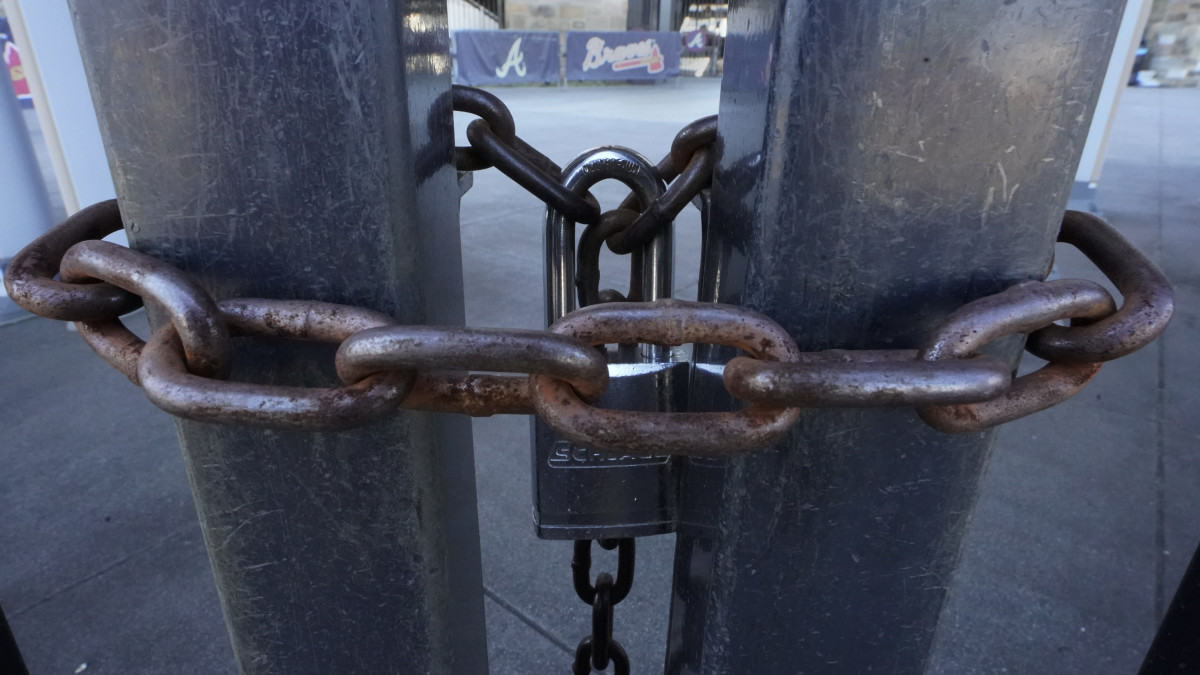MLB Is Risking the Entire Season as Rob Manfred Cancels More Games
Major League Baseball has canceled the first four series of 2022, commissioner Rob Manfred said on Wednesday. It will be difficult to play 162 games. At some point we have to wonder when that number will be 0.
Day 98 of the owner-imposed lockout ended the same way the first 97 did: without a collective-bargaining agreement between the league and the players association. The sides, shuttling back and forth from their offices in Midtown Manhattan highrises and communicating by phone and email, neared something approaching a compromise on many of the major economic questions. But they did not come to terms on the question of a draft for international amateurs—a question that nearly exploded negotiations the last time they discussed this, before the 2017 season.

They could still force through a full season. Manfred canceled the first two series last week but backtracked this week, saying on Monday that the league could still stage 162 games if the parties made a deal by Tuesday. At 3 a.m. on Wednesday, after nearly 17 hours of bargaining, he agreed to extend that cutoff a little further.
The deadline was artificial in some ways—which became clear when the sides blew by it—but the calendar is a third opponent in these talks. Pitchers need three weeks to build up. TV deals require the playoffs to end by early November. Baseball is a sport played every day. Wednesday evening, Manfred re-canceled those first two series and canceled two more, leaving Opening Day no sooner than April 14. (April 15 is the 75th anniversary of Jackie Robinson’s MLB debut. His widow, Rachel, is 99 years old.) If it goes much later than that, it will be hard to play a full season.
And it only gets harder now. The owners want to prorate players’ salaries per number of games played. Players believe they did not lock themselves out and they should therefore be paid for 162 games no matter how many take place. So in addition to fighting over the competitive-balance tax (they’re between $2 million and $8 million apart per year), the league minimum ($10,000 apart per player per year), the pool of money that would reward young players with excellent seasons (between $25 million and $45 million apart) and the draft-pick compensation when players leave in free agency (the players want it gone, the league wants to attach it to the implementation of an international draft), they will now squabble over how to pay for whatever season they salvage.
No formal bargaining sessions are scheduled, but the sides intend to keep talking on Wednesday night and into Thursday. Still, the distrust that has marred these conversations for years has only deepened. Players believe that the league waited until this late stage of negotiations to tie a deeply contentious issue—the international draft—to an issue important to the players (the removal of draft-pick compensation). When certain free agents sign with new teams, their former team receives a draft pick and their new team forfeits one. New teams, in turn, make reduced offers to the free agents; players believe this system costs them millions of dollars per year. They also oppose an international draft because they believe it limits foreign amateurs’ earning potential. The league contends that the international draft has been part of every proposal it has made since July 2021. The union says it has rejected it every time and made clear it was a problem. Asked Wednesday afternoon when the league realized that the international draft would be a major sticking point, an MLB official said, “Too late.” And round and round we go.
I was in FL. We never offered the Int’l Draft. We did discuss it, but MLB told us they were NOT going to offer anything for it. At that point, we informed all players & agreed to no draft.
— Max Scherzer (@Max_Scherzer) March 10, 2022
This is MLB muddying the waters & deflecting blame. Fans, pls hang in there with us.
Players are preparing to play but are prepared to lose the season, said someone familiar with their thinking. This is a difficult position around which to create unity: Their careers are short, and whether they are trying to build a Hall of Fame case or just want to hit one major league home run, they are eager to retake the field. They would prefer to reach a deal and are bargaining with the intention of doing so. But the person insisted that they are ready, financially and emotionally. The union has withheld their licensing checks since 2018, leaving them with a war chest the size of which the source would not disclose. And union leadership has framed the battle as one of solidarity. “You can’t take a bad deal just to play,” the person said, “Because it’ll affect not only you and the people around you but it will affect generations to come.”
So, of course, would a missed season.
More MLB Coverage:
• The Path to a New CBA: Trade Economics for Rule Changes
• Baseball Should Expand the Playoffs to 14 Teams
• ‘Since When Were Women Allowed’: Inside Their Push to Break Into Baseball
• MLB Owners Fail to Realize Their Own Foolishness
